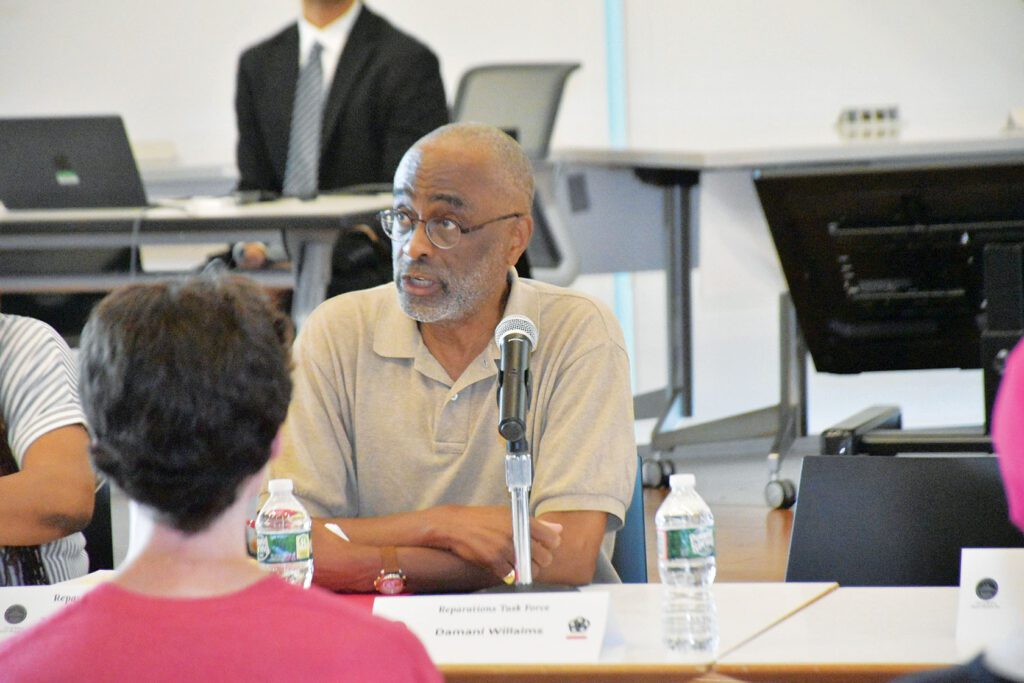Boston reparations task force seeks researcher
Newly formed group aims to document historical ties to slavery

Members of the city’s newly formed Task Force on Reparations discussed recruiting a professional researcher to document and explain the history and impact of Boston’s role in the Atlantic slave trade.
The discussion, which comes as the task force begins to lay the foundation for its work, was held July 13 at the Bruce C. Bolling Municipal Building in Roxbury.
The task force was established to advise City Hall on healing generations of racial inequities in Boston, particularly for descendants of enslaved African Americans.
“We’re looking at the opportunities … to be able to remember, reclaim, restore and reimagine [our experiences],” said L’Merchie Frazier, a member of the task force, during the meeting.
Five of the eight task force members attended the meeting and reviewed a draft of a request for proposal for a research partner.
Joseph Feaster Jr., who chairs the task force, said input from the community is valued at meetings. “This process of inclusiveness with the community is very … important, and we’re intentional about that,” he said.
The task force, made up of long-time civic leaders and local advocates, is charged with partnering with a researcher to study and document the legacy of slavery in Boston, assess the city’s policies and actions, and make final recommendations to the City of Boston.
During the meeting, members of the public and the task force expressed their concerns about the requirements for the qualifications for the research partner as outlined in a draft request for proposal, which helps to direct the task force’s mission.
“We have to be serious about our intent to understand where [the researcher’s] lens is entering this history, whether they’re looking at a diminished people, a victimized people, [or] whether this is historic research that will be guided by the opportunity to look at people who are triumphant against all odds,” Frazier said.
The draft specifies that the research partner submit “peer-reviewed” work in their application, but some community members cautioned that that would be a barrier for possible candidates. The residents also stressed that time is of the essence regarding research and uncovering the history of enslavement in Boston.
“[The RFP] needs to be multifaceted and multigenerational,” said Tayla Douglas, who is starting her own organization, Healthy Village Happy Communities, to connect young Black people with older mentors in her Dorchester community.
The task force is seeking an individual or organization to research enslavement throughout Boston and Massachusetts starting from the early 1600s to present-day systemic racism, according to a draft of the request for proposal.
The research is intended to produce a report recommending possible reparations for “descendants of formerly enslaved people of African descent in the City of Boston,” the draft document said.
Submissions for research partners will begin at least by the fall, once the request for proposal is finalized. A finalist is expected to be selected by the end of the year, Feaster said.
“I personally want it [the RFP] to be a living document,” said task force member George “Chip” Greenidge, who is founder of Greatest Minds, a non-profit organization that works with high school and college students to become young professionals and leaders.
Greenidge also addressed the public meetings in an interview, saying that while they are sanctioned by the city, they also act “as a healing space for people to share their stories and their histories around being Black.”
“We must be very sensitive of how people want to communicate their frustrations,’’ said Greenidge, “and their hardships and the role that discrimination has played in their lives in Boston.”
Douglas, the Dorchester resident, said firsthand accounts are essential to understanding how the impact of enslavement continues to permeate into the present day. She said she hopes the language used in the final request for proposal prioritizes the experiences of elders in the community.
“If we don’t get that [information] from them now,’’ she said, “how do we explain how our people have been affected?”







